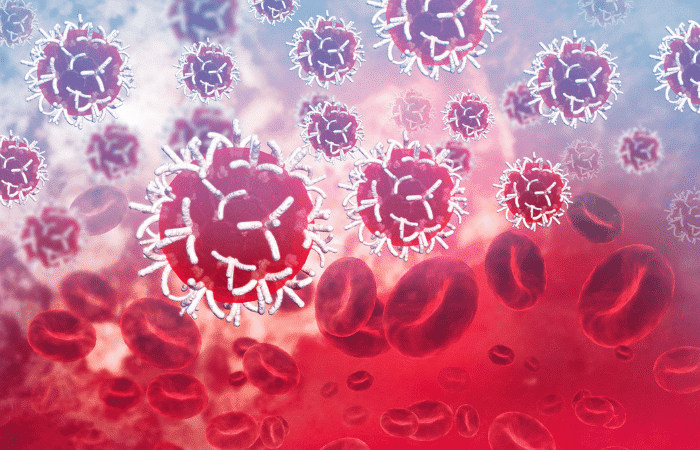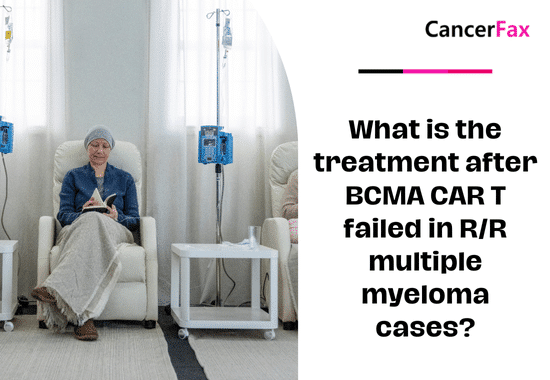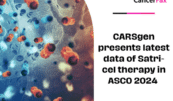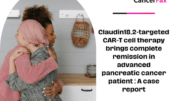What is the treatment after BCMA CAR T failed in R/R multiple myeloma cases?
OriCAR-017 for RRMM
A top biopharmaceutical company in the clinical stage, Oricell Therapeutics, shared the long-term follow-up results of OriCAR-017, a Phase I study that looked at how well GPRC5D-targeted CAR-T therapy worked in people with relapsed or refractory multiple myeloma (RRMM). The results were presented orally at the 2024 American Society of Clinical Oncology (ASCO) Annual Meeting.
Effectiveness and Longevity of OriCAR-017 in Patients with Relapsed and Refractory Multiple Myeloma
The new information shows that OriCAR-017 has strong and long-lasting effects on people with relapsed and refractory multiple myeloma (RRMM), and it also has a good safety record. Some of the people in this group have not responded to anti-CD38 treatments, proteasome inhibitors (PIs), immunomodulatory drugs (IMIDs), or BCMA-targeting CAR-T treatments.
There is strong evidence that OriCAR-017 is a very promising treatment for relapsed and refractory multiple myeloma (RRMM) because it works for a longer time and is safe, according to the follow-up studies. Presently, Oricell is making steady progress in the clinical development of OriCAR-017 in both China (NCT06182696) and the United States (NCT06271252).
All ten patients showed positive responses to OriCAR-017 as of January 16, 2024, and the final patient successfully completed a 24-month follow-up. The overall response rate (ORR) was 100.0%, with a strict complete response rate (sCR) of 80.0% and a very excellent partial response rate (VGPR) of 20.0%. Every patient successfully obtained complete eradication of minimum residual disease (MRD) by day 28, and this was subsequently confirmed as 100% negative at the 3-month follow-up.
The mDoR was 10.43 months (95% CI, 5.00-17.00), the mPFS was 11.37 months (95% CI, 5.93-18.00), and the mOS was not determined yet (7 patients were still under survival follow-up, 1 patient died due to disease progression, and 2 patients died from COVID-19).
Among the patients in the high-dose group, 67% had received previous treatment with BCMA CAR-T. The median duration of response (mDoR) in this group was 17.23 months, with a 95% confidence interval (CI) ranging from 7.33 to not reached (NR). The median progression-free survival (mPFS) in this group was 19.10 months, with a 95% CI ranging from 8.30 to NR. Presently, a patient who has undergone BCMA CAR-T cell therapy treatment continues to be in a state of remission for more than 24 months.
OriCAR-017’s Safety Profile in the Treatment of Relapsed or Refractory Multiple Myeloma (RRMM)
The medication was well-tolerated, with 90% of patients reporting Grade 1 cytokine release syndrome (CRS) and only 10% experiencing Grade 2 CRS. No CRS with a grade of 3 or higher was detected. The CRS onset had a median time of 2 days, ranging from 1 to 9 days. The duration of CRS had a median of 6 days, ranging from 3 to 9 days.
There were no instances of immunological effector cell-associated neurotoxicity syndrome (ICANS) or dose-limiting toxicities (DLTs) observed. No significant adverse events (SAEs) or deaths due to therapy, cerebellar abnormalities, or delayed infections were observed.
Pharmacokinetics (PK) of OriCAR-017 in patients with relapsed and refractory multiple myeloma (RRMM)
There were no variations in the way the drug was absorbed, distributed, metabolized, and eliminated at different dose levels. The maximum concentration (Cmax) of the drug was measured at 7354.7 copies per microliter, and the area under the concentration-time curve from 0 to 28 days (AUC0-28) was measured at 68587 copies per day per microgram.
At elevated doses, CAR-T cells remained detectable for 9 months, and after 21 months of observation, one patient exhibited CAR-T cell expansion surpassing the lower limit of quantification (LLOQ). Patients who had a Tlast of 9 months or more experienced a longer progression-free survival (PFS) compared to those with a Tlast of less than 9 months.
Gene G5’s expression in reaction to OriCAR-017 Management
There was no detectable link between the expression of antigens and the effectiveness of the treatment. Based on the first data from all patients, flow cytometry found that GPRC5D expression was present in plasma cells (MMPC) in the bone marrow. However, in 50% of patients who experienced a relapse, there was a decrease in the level of GPRC5D expression.

OriCAR-017 exhibits substantial promise in patients with highly advanced relapsed/refractory multiple myeloma (RRMM)
It is important to mention that the study involved patients with intricate and advanced illnesses. Ten patients with R/R MM were studied. Fifty percent had at least one BCMA-directed CAR-T cell therapy, seventy percent had high-risk cytogenetics, seventy percent had an ECOG 2 score, and eighty percent were in International Staging System (ISS) stages II and III. Forty percent had extramedullary disease (EMD). CAR T-Cell therapy in China is developing at a very rapid pace, and very soon we will see approvals for CAR T-Cell therapy for solid tumors too. Top hospitals for CAR T cell therapy in China are conducting clinical trials in this area.
The results show that OriCAR-017 can be a safe and effective treatment option for people with relapsed or refractory multiple myeloma (RRMM). This is a big step forward in the fight against this disease and gives people who are going through tough medical situations hope.
Dr. Nishant Mittal is a highly accomplished researcher with over 13 years of experience in the fields of cardiovascular biology and cancer research. His career is marked by significant contributions to stem cell biology, developmental biology, and innovative research techniques.
Research Highlights
Dr. Mittal's research has focused on several key areas:
1) Cardiovascular Development and Regeneration: He studied coronary vessel development and regeneration using zebrafish models1.
2) Cancer Biology: At Dartmouth College, he developed zebrafish models for studying tumor heterogeneity and clonal evolution in pancreatic cancer.
3) Developmental Biology: His doctoral work at Keio University involved identifying and characterizing medaka fish mutants with cardiovascular defects.
4) Stem Cell Research: He investigated the effects of folic acid on mouse embryonic stem cells and worked on cryopreservation techniques for hematopoietic stem cells.
Publications and Presentations
Dr. Mittal has authored several peer-reviewed publications in reputable journals such as Scientific Reports, Cardiovascular Research, and Disease Models & Mechanisms1. He has also presented his research at numerous international conferences, including the Stanford-Weill Cornell Cardiovascular Research Symposium and the Weinstein Cardiovascular Development Conference.
In summary, Dr. Nishant Mittal is a dedicated and accomplished researcher with a strong track record in cardiovascular and cancer biology, demonstrating expertise in various model systems and a commitment to advancing scientific knowledge through innovative research approaches.
- Comments Closed
- June 6th, 2024






BCMA CAR-T resistance, Bispecific antibody therapy, CAR-T failure management, GPRC5D-targeted treatment, Next-line myeloma drugs, Post-CAR-T myeloma treatment, Relapsed refractory myeloma options, Salvage therapy for myeloma
CancerFax is the most trusted online platform dedicated to connecting individuals facing advanced-stage cancer with groundbreaking cell therapies.
Send your medical reports and get a free analysis.
🌟 Join us in the fight against cancer! 🌟
Привет,
CancerFax — это самая надежная онлайн-платформа, призванная предоставить людям, столкнувшимся с раком на поздних стадиях, доступ к революционным клеточным методам лечения.
Отправьте свои медицинские заключения и получите бесплатный анализ.
🌟 Присоединяйтесь к нам в борьбе с раком! 🌟